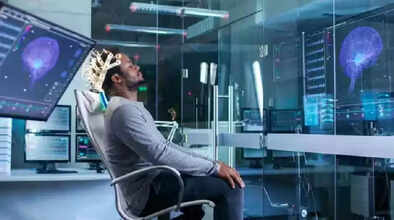Scientists have accomplished a surprising feat! Computers will now be powered by brains. Learn about the technology.

It sounds like something out of a science fiction movie, but it's becoming a reality. Select scientists around the world are working to develop computers powered by living cells.
Brain to Power Computers: It sounds like something out of a science fiction movie, but it's becoming a reality. Select scientists around the world are working to develop computers powered by living cells. This is called the world of biocomputing.
New Discovery from Switzerland
According to a BBC report, a team of Swiss scientists is rapidly working on this unique technology. Their dream is to have data centers built with living servers that can learn like AI but use much less energy. The project is being led by Dr. Fred Jordan, co-founder of FinalSpark Labs. They believe this technology will change the very definition of computing in the future.
What is Wetware?
While traditional computers run on hardware and software, this new technology works on a completely different principle, which scientists have named Wetware. In this process, neurons are developed from stem cells obtained from human skin, which are then grown as organoids. These small neuron clusters are connected to electrodes so that they can be used as mini-computers.
Dr. Flora Brozzi, a cellular biologist at FinalSpark, explains that these tiny white spheres are actually mini human brains, developed from stem cells. They are fully alive, although not as complex as human brains.
After several months of processing, when these organoids are ready, they are connected to electrodes and their responses are tested through simple keyboard commands. When a key is pressed, electrical signals are sent through the electrodes, and if the experiment is successful, brainwave-like activity is displayed on the computer screen.
First Steps Toward Learning
Dr. Jordan explains that this technology is still in its early stages. By applying electrical stimulation to these organoids, efforts are being made to understand whether they can develop the ability to learn or respond.
He says, "Just like in AI, we are training these neurons to provide input and output, such as identifying whether a cat is a cat or not by showing a picture of it."
Ordinary computers only require electricity, but biocomputers require nutrition to sustain life. According to Professor Simon Schultz of Imperial College London, "The human brain has blood vessels that deliver nutrients, but organoids lack such a mechanism. This is the biggest scientific challenge."
Currently, the mini-brains created by FinalSpark can survive for up to four months. But the interesting thing is that just before death, a sudden increase in electrical activity is recorded in them, just like the heart and brain speed increase before death in humans.

